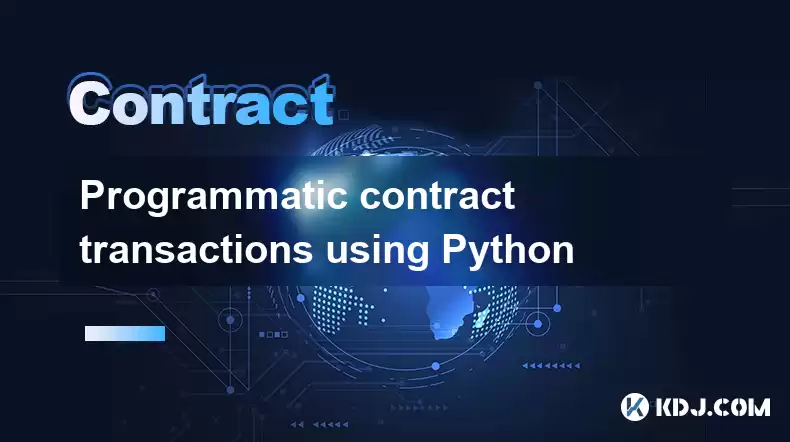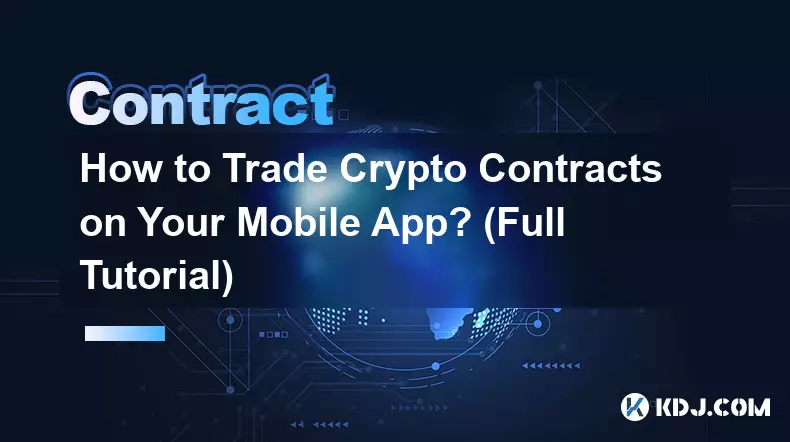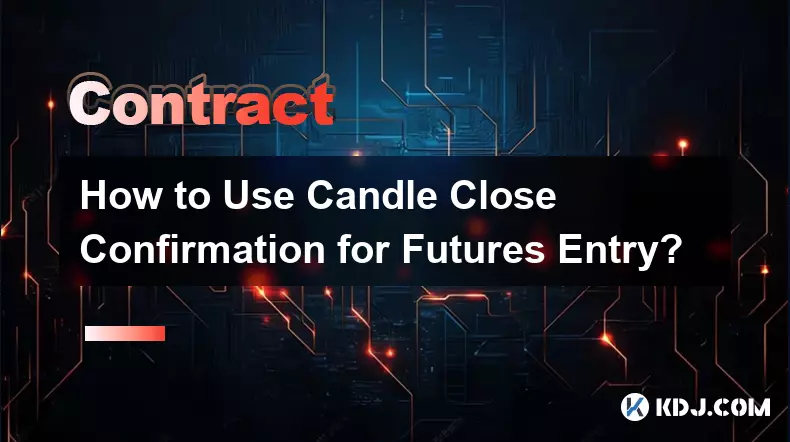-
 bitcoin
bitcoin $87959.907984 USD
1.34% -
 ethereum
ethereum $2920.497338 USD
3.04% -
 tether
tether $0.999775 USD
0.00% -
 xrp
xrp $2.237324 USD
8.12% -
 bnb
bnb $860.243768 USD
0.90% -
 solana
solana $138.089498 USD
5.43% -
 usd-coin
usd-coin $0.999807 USD
0.01% -
 tron
tron $0.272801 USD
-1.53% -
 dogecoin
dogecoin $0.150904 USD
2.96% -
 cardano
cardano $0.421635 USD
1.97% -
 hyperliquid
hyperliquid $32.152445 USD
2.23% -
 bitcoin-cash
bitcoin-cash $533.301069 USD
-1.94% -
 chainlink
chainlink $12.953417 USD
2.68% -
 unus-sed-leo
unus-sed-leo $9.535951 USD
0.73% -
 zcash
zcash $521.483386 USD
-2.87%
Programmatic contract transactions using Python
Programmatic contract transactions automate interactions with blockchain networks by executing smart contracts using a programming language, like Python, for increased efficiency, customization, and cost savings.
Feb 22, 2025 at 12:42 pm

- Understanding programmatic contract transactions
- Benefits of using programmatic contract transactions
- Prerequisites for programmatic contract transactions
- Steps for programmatic contract transactions using Python
- Debugging and error handling in programmatic contract transactions
- Best practices for programmatic contract transactions
- Examples of programmatic contract transactions
Programmatic contract transactions are automated interactions with a blockchain network, where smart contracts are executed using a programming language. Unlike manual transactions initiated through a wallet interface, programmatic transactions are executed through custom-written code, allowing for complex interactions and the automation of routine tasks.
2. Benefits of Using Programmatic Contract Transactions- Automation: Automate repetitive or time-consuming tasks, such as portfolio rebalancing or arbitrage trading.
- Efficiency: Reduce human error and increase the speed of transaction execution.
- Customization: Tailor transactions to specific needs, such as customized order types or complex trade strategies.
- Cost Savings: Eliminate intermediary fees associated with manual transactions.
- Enhanced Control: Gain direct control over the transaction process and access advanced features not available through standard wallets.
- Blockchain Development Knowledge: Familiarity with blockchain fundamentals, smart contract concepts, and the relevant programming language.
- Blockchain Network Access: Node or API connectivity with the blockchain network to send and receive transactions.
- Smart Contract Deployment: Deploy the relevant smart contracts on the blockchain and obtain their addresses.
- Programming Environment Setup: Install the required programming language and any necessary libraries.
- Establish a connection to the blockchain network using a node or RPC client.
- Use libraries like web3 or Etherscan to simplify the connection and transaction processes.
- Define the transaction parameters, including the recipient address, value, and any data needed for the smart contract call.
- Sign the transaction using the private key associated with the sender's wallet.
- Broadcast the signed transaction to the blockchain network using the connected node.
- Wait for the transaction to be confirmed by multiple nodes and included in a block.
- Track the status of the transaction using web3 or other transaction monitoring tools.
- Debug and troubleshoot any errors that may occur during the transaction process.
- Thorough Testing: Execute the code on different scenarios and test conditions to identify and resolve any potential issues.
- Logging and Tracing: Enable logging to record all transaction-related events and trace the execution path for debugging purposes.
- Error Handling: Implement robust error handling routines to catch and handle exceptions, such as failed connections or invalid transactions.
- Monitoring and Alerts: Set up alerts to monitor the performance of the programmatic transactions and notify in case of any anomalies.
- Security: Always prioritize the security of the private keys and the smart contracts used in the transactions.
- Efficiency: Optimize the code to minimize gas costs and transaction latency.
- Modularity: Break down complex transactions into smaller modules to facilitate maintenance and debugging.
- Documentation: Thoroughly document the code and transaction process for readability and future reference.
- Security Auditing: Engage in regular security audits to identify vulnerabilities and improve the overall security of the process.
- Automated Portfolio Rebalancing: Automatically adjust the allocation of assets within a portfolio based on predefined rules.
- Arbitrage Trading: Scan for and execute arbitrage opportunities across multiple exchanges in real-time.
- Token Distribution: Distribute newly issued tokens to multiple recipients based on specified criteria.
- Multi-Signature Transactions: Facilitate transactions requiring the approval of multiple authorized parties.
- Custom Order Types: Create and execute customized order types, such as stop-loss orders, using smart contracts.
A: Python's versatility, simplicity, and extensive library support make it a popular choice for blockchain development. Web3, a Python library, simplifies the process of interacting with blockchain networks, creating transactions, and managing smart contracts.
Q: How do I secure programmatic contract transactions?A: Prioritize the security of your private keys and smart contracts by implementing strong encryption mechanisms, regular security audits, and a robust error handling strategy. Monitor transactions closely to detect any suspicious activities.
Q: What is a Solidity smart contract?A: Solidity is a high-level programming language specifically designed for developing smart contracts on the Ethereum blockchain. Smart contracts are self-executing contracts that run on the blockchain, enabling the creation of decentralized and automated applications.
Q: How can I estimate the gas cost of programmatic contract transactions?A: Use gas estimation tools provided by web3 or other blockchain utilities. These tools help you calculate the transaction cost before execution, allowing you to optimize the efficiency of your transactions.
Q: Where can I learn more about programmatic contract transactions?A: Refer to the documentation for the web3 library, explore online tutorials and resources for blockchain development, and join relevant community forums for sharing knowledge and troubleshooting.
Disclaimer:info@kdj.com
The information provided is not trading advice. kdj.com does not assume any responsibility for any investments made based on the information provided in this article. Cryptocurrencies are highly volatile and it is highly recommended that you invest with caution after thorough research!
If you believe that the content used on this website infringes your copyright, please contact us immediately (info@kdj.com) and we will delete it promptly.
- Big Apple Shivers: Crypto Fear Returns to 2022 Levels Amidst Market Downturn Warnings
- 2026-02-07 21:40:02
- Crypto Titans Clash: Bitcoin and Ethereum Vie for Market Leadership Amidst Volatility and Strategic Shifts
- 2026-02-07 22:10:01
- ENSv2 Elevates to Ethereum Mainnet: A New Chapter for Decentralized Identity
- 2026-02-07 22:10:01
- Arthur Hayes Dissects Bitcoin Selloff: It's All About Dollar Liquidity and IBIT's Hedging Hustle
- 2026-02-07 19:25:02
- Trump's Crypto Rollercoaster: Bitcoin's Wild Ride and Industry Woes
- 2026-02-07 19:10:01
- Vitalik Buterin's Patient Pursuit: Ethereum's Co-Founder Backs Privacy, Signaling a Long Wait for Foundational Crypto Strength
- 2026-02-07 19:10:01
Related knowledge

How to Use "Mark Price" vs. "Last Price" to Prevent Liquidation?
Feb 07,2026 at 05:39pm
Understanding Mark Price Mechanics1. Mark price is a composite value derived from multiple spot exchange indices and funding rate adjustments, designe...

How to Set Up Recurring Profits Using Automated Trading Signals?
Feb 07,2026 at 06:59pm
Understanding Automated Trading Signals in Cryptocurrency Markets1. Automated trading signals are algorithmically generated recommendations that indic...

How to Use Price Action Trading for Crypto Perpetual Contracts?
Feb 06,2026 at 03:20pm
Understanding Price Action Fundamentals1. Price action trading relies entirely on raw market data—candlestick formations, support and resistance level...

How to Trade Crypto Contracts on Your Mobile App? (Full Tutorial)
Feb 07,2026 at 02:59am
Setting Up Your Mobile Trading Environment1. Download the official mobile application from the exchange’s verified website or trusted app store listin...

How to Manage Emotions and "Revenge Trading" in Futures?
Feb 05,2026 at 12:19am
Understanding Emotional Triggers in Futures Markets1. Market volatility directly impacts psychological states, often amplifying fear or euphoria based...

How to Use Candle Close Confirmation for Futures Entry?
Feb 05,2026 at 04:20pm
Understanding Candle Close Confirmation1. A candle close confirmation occurs when the final price of a candlestick settles beyond a predefined level, ...

How to Use "Mark Price" vs. "Last Price" to Prevent Liquidation?
Feb 07,2026 at 05:39pm
Understanding Mark Price Mechanics1. Mark price is a composite value derived from multiple spot exchange indices and funding rate adjustments, designe...

How to Set Up Recurring Profits Using Automated Trading Signals?
Feb 07,2026 at 06:59pm
Understanding Automated Trading Signals in Cryptocurrency Markets1. Automated trading signals are algorithmically generated recommendations that indic...

How to Use Price Action Trading for Crypto Perpetual Contracts?
Feb 06,2026 at 03:20pm
Understanding Price Action Fundamentals1. Price action trading relies entirely on raw market data—candlestick formations, support and resistance level...

How to Trade Crypto Contracts on Your Mobile App? (Full Tutorial)
Feb 07,2026 at 02:59am
Setting Up Your Mobile Trading Environment1. Download the official mobile application from the exchange’s verified website or trusted app store listin...

How to Manage Emotions and "Revenge Trading" in Futures?
Feb 05,2026 at 12:19am
Understanding Emotional Triggers in Futures Markets1. Market volatility directly impacts psychological states, often amplifying fear or euphoria based...

How to Use Candle Close Confirmation for Futures Entry?
Feb 05,2026 at 04:20pm
Understanding Candle Close Confirmation1. A candle close confirmation occurs when the final price of a candlestick settles beyond a predefined level, ...
See all articles










































































